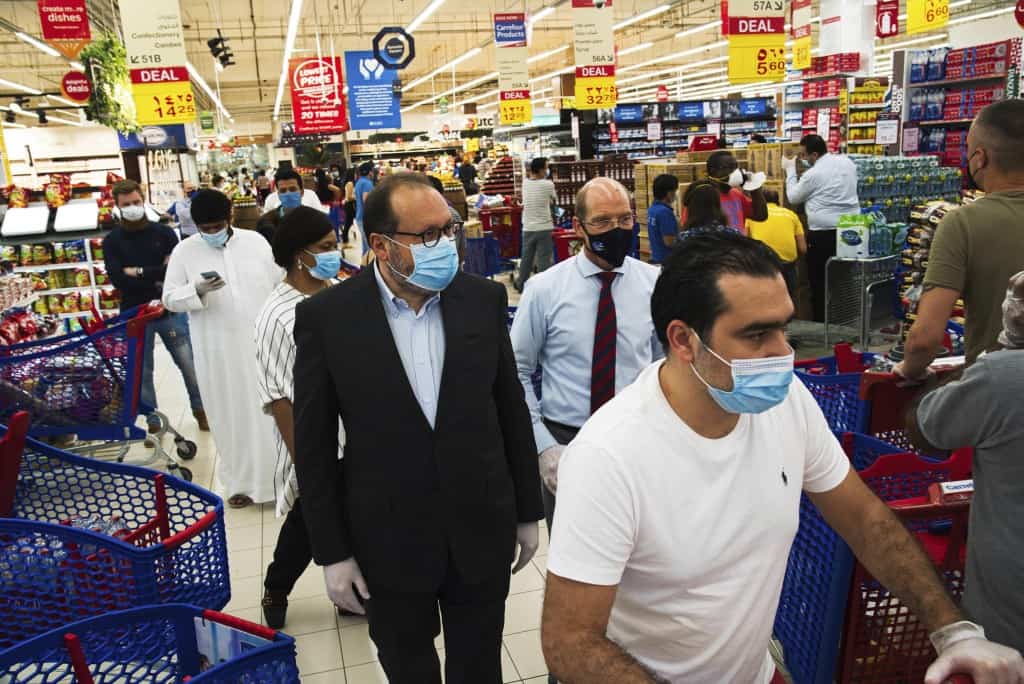Majid Al Futtaim, an Emirati company that operates grocery stores across the Middle East, is making an important promise to its staff: No pay cuts and no layoffs. The company owns and operates grocery stores and malls and employs 19,000 workers, most of whom are foreign nationals. “We have taken a decision that we are not going to furlough people,” Alain Bejjani, the company’s CEO, told the Associated Press. “We are not going to touch the basic salaries,” the executive continued.
The importance of remittances
A large swath of the company’s employees come from abroad. They work in the greater Middle East and send much of their wages to their families abroad. These called remittances provide a vital income for workers’ families in this difficult time. Many of the company’s employees come from Bangladesh, Egypt, India, Nepal, and the Philippines, where a Dubai-level wage can provide much-needed financial support.
Across the planet, people are losing their jobs and their primary source of income as pandemic lock-downs and curfews severely impact businesses. Majid al Futtaim has demonstrated that showing solidarity with staff is possible, especially when the income they make often provides for many other relatives. “It means a lot, during tough times, to make sure that we are one family and we are dealing with our people in the best possible way,” Bejjani told the Associated Press (AP).
Forward thinking
The company’s approach towards its staff is a breath of fresh air during an economic crisis where the poorest and lowest-skilled workers are often the first to lose their work. The company has implemented several security measures to ensure staff and customers can safely shop in their supermarkets. On entry, customers have their temperature checked and everyone in the store is expected to wear gloves and masks.
The current economic crisis and government lockdowns present a new paradigm for the Emirati business. While shopping in person became more limited, online shopping skyrocketed. Majid al Futtaim-operated Carrefour stores in the UAE have seen an increase of 300% in online grocery shopping, a 700% increase in Egypt, and a whopping 1,000% increase in Saudi Arabia. Bejjani thinks this is not a temporary change, but a shift in how customers approach shopping that will continue even after the pandemic subsides.
Supply chains
Grocery stores typically have very short continual supply chains. With little space to store goods, markets are constantly restocked in what is called a “just-in-time” supply chain. While this system ensures daily fresh produce and little excess storage, it does make the supply chain vulnerable to disruptions.
Because Majid al Futtaim is based in UAE, a country that imports most of its food and basic goods, the company maintains a three-month stockpile. Storing the products is expensive, but in this time of crisis this tactic has proven helpful, with shops remaining well-stocked.
The company’s CEO does worry about food security in other countries as the pandemic and its response measures increasingly interrupt supply chains. In the national market, the executive said the pandemic “has had an impact, but you haven’t seen anything that was, I would say, disruptive.”
Although his business is able to maintain and even increase their stockpile of supplies, the CEO worries about global food security as countries increasingly limit exports, ignoring UN recommendations to ensure global supply chains remain uninterrupted. Bejjani elaborated that “some countries decided to stop exporting some essential items they need.”
Changing habits
The CEO told the AP that changing trends in consumer behavior will likely change in a post-coronavirus world, saying, “how do you make sure that we continue to win in a post COVID-19 world, where health and safety is going to be a big reason to re-adapt customer experience.” The company’s malls have canceled rent payments for its tenants during the crisis but are aware that customers might not return after the pandemic at the same rate as they came to shop before.
Whether life will fully return “back to normal” is doubtful according to the company’s CEO. Spending patterns might change and business travel might never fully rebound, Bejjani said. Tomorrow’s shoppers will be more aware of safety precautions and getting consumers back into physical stores will require more of retail experience as much shopping moves online.

